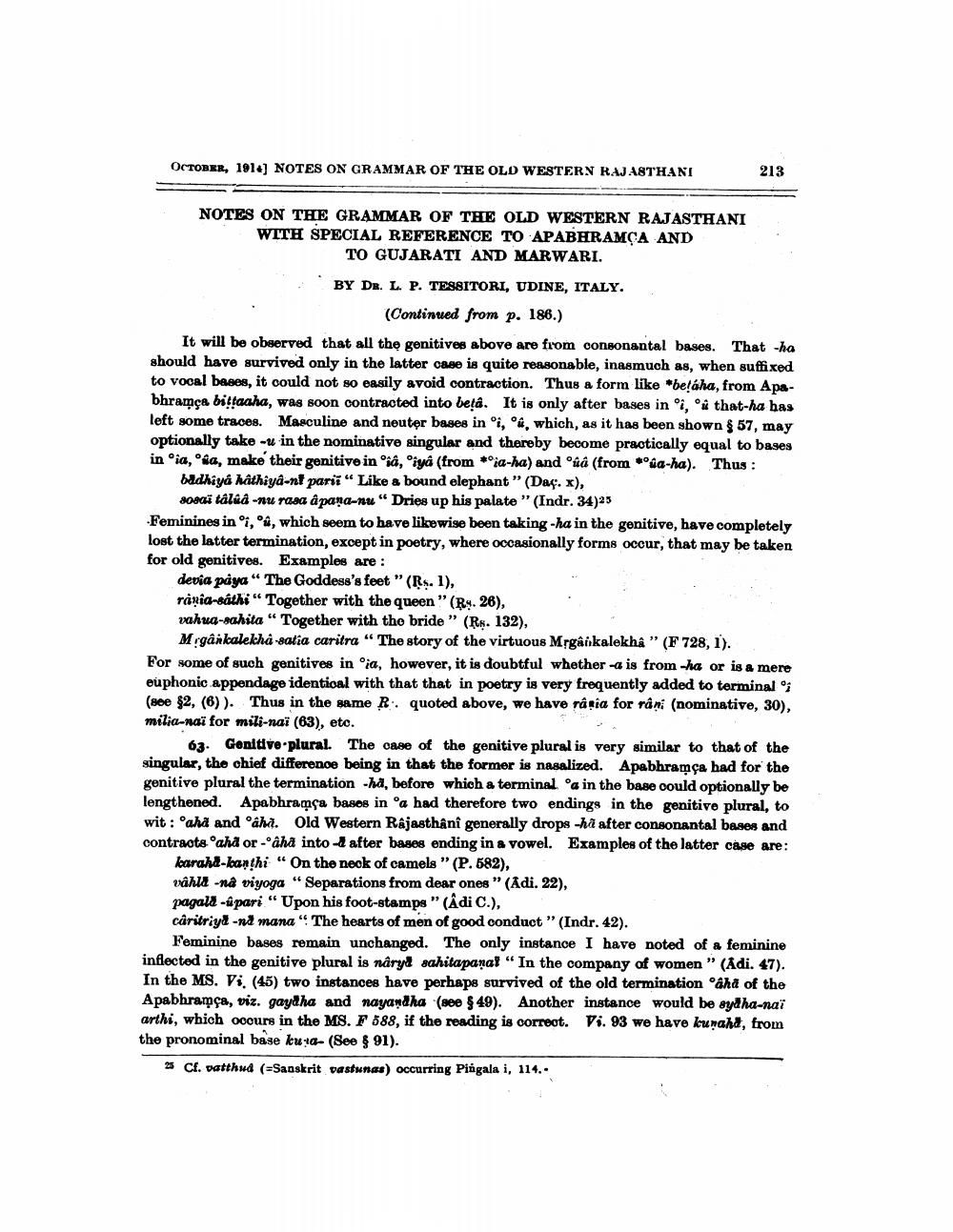________________
OCTOBER, 1914) NOTES ON GRAMMAR OF THE OLD WESTERN RAJASTHANI
213
NOTES ON THE GRAMMAR OF THE OLD WESTERN RAJASTHANI WITH SPECIAL REFERENCE TO APABHRAMCA AND
TO GUJARATI AND MARWARI. BY DR. L. P. TESSITORI, UDINE, ITALY.
(Continued from p. 186.) It will be observed that all the genitives above are from consonantal bases. That -ha should have gurvived only in the latter case is quite reasonable, inasmuch as, when suffixed to vocal bases, it could not so easily avoid contraction. Thus a form like "be!áha, from Apabhramça bittaaha, was soon contracted into beta. It is only after bases ini, that-ha bas left some traces. Masculine and neuter bases in oi, o4, which, as it has been shown $ 57, may optionally take -u in the nominative singular and thereby become practically equal to bases in oia, osa, make their genitive in "ia, iya (from *ia-ha) and olla (from *da-ha). Thus :
udhiya nathiya-nt pari "Like a bound elephant" (Dac. x),
sonai tála-nu rasa & pana-nu" Dries up his palate "(Indr. 34)25 Feminines in oi, o4, which seem to have likewise been taking -ha in the genitive, have completely lost the latter termination, except in poetry, where occasionally forms occur, that may be taken for old genitives. Examples are :
devia paya“ The Goddess's feet" (Rs. 1), rània-sáthi" Together with the queen" (Ry. 26), vahua-nahita" Together with the bride" (Rs. 132),
Migânkalekha -satia caritra “The story of the virtuous Mrgâikalekha " (F 728, 1). For some of such genitives in oia, however, it is doubtful whether-a is from ha or is a mere euphonic appendage identioal with that that in poetry is very frequently added to terminal (see $2, (6)). Thus in the same R. quoted above, we have rakia for râni (nominative, 30), milia-naï for mili-naï (63), etc.
63. Genitive plural. The case of the genitive plural is very similar to that of the singular, the chief difference being in that the former is nasalized. Apabhramça had for the genitive plural the termination -ha, before which a terminal oa in the base could optionally be lengthened. Apabhramça bases in a had therefore two endings in the genitive plural, to wit : aha and Raha. Old Western Rajasthani generally drops ha after consonantal bases and contracts aha oraha into - after bases ending in a vowel. Examples of the latter case are:
karahd-kanthi “ On the neck of camels " (P. 582), vahid -na viyoga "Separations from dear ones" (Adi. 22), pagald - û pari "Upon his foot-stamps" (Adi C.), câritriyd-nd mana". The hearts of men of good conduct " (Indr. 42).
Feminine bases remain unchanged. The only instanoe I have noted of a feminine inflectod in the genitive plural is naryd sahitapanal "In the company of women " (Adi. 47). In the MS. Vi. (45) two instances have perhaps survived of the old termination Raha of the Apabhramça, viz. gaydha and nayandha (see $ 49). Another instance would be sydha-nai arthi, which occurs in the MS. F 588, if the reading is correct. Vi. 93 we have kunaha, from the pronominal base luna- (See & 91).
» Cf. vatthud (=Sanskrit vastunas) occurring Pingala i, 114..




